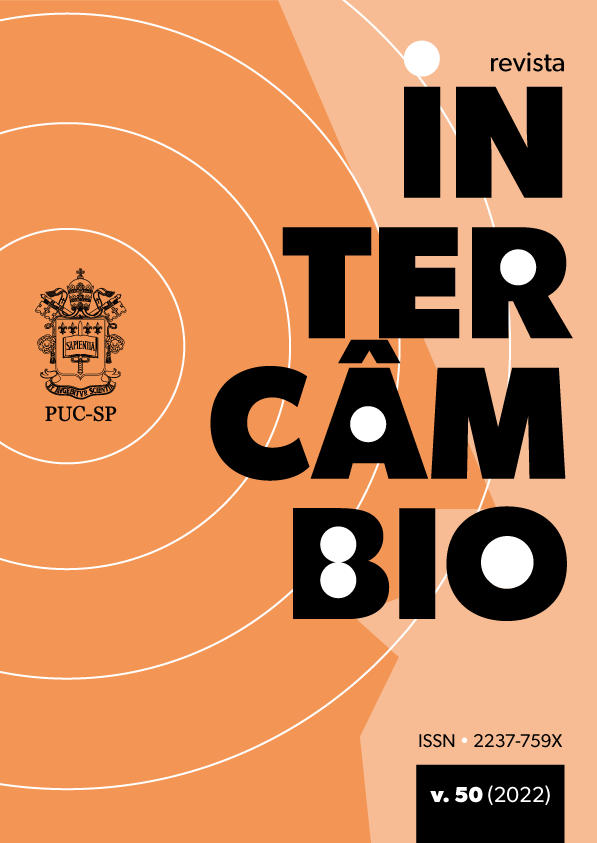| Qualis: B1 |
| Área do conhecimento: Linguística e Literatura |
Vol. 50 (2022): Temático

This volume of the Intercâmbio Journal, number 50, assembles papers of researchers affiliated to a trend of thought that has speech symptoms as the empirical trigger of theoretical and clinical consistent elaborations strongly committed to a particular theoretical linguistic approach. It is worth clarifying that the original and solid argumentative framework of what has been named Language Clinic is deeply connected to careful theoretical dialogues with seminal authors from the areas of Linguistics and Psychoanalysis. These two fields of studies meet without actually intersecting in a construction that centers around questions and discussions derived from the insistent resistance imposed by the heterogeneity and singularity of symptomatic linguistic occurrences in speech. Indeed, errors and speech symptoms a resistant to the so called “scientific project” founded on the possibility of empirical regularization of empirical data, which assures its prediction ideal. Cláudia Lemos from UNICAMP, since 1980 raised empirical and theoretical problem linked to the glaring heterogeneity and unpredictability of children’s errors in the language acquisition process. She stated that descriptive grammatical apparatuses could not apprehend those intriguing speech manifestations that perpess and are, in fact, proper to children’s speech. It is worth strengthening that speech symptoms fit more radically within this problematic situation.
Saussure came is an empirical – theoretical solution regarding the approach to speech errors and symptoms since a suspends grammatical descriptions in favor of the explanations concerning the universal functioning of language that includes any and all linguistic manifestations whether expected or unexpected; correct or incorrect; right or wrong (SAUSSURE, [1916] 2016, p. 371). Also, Benveniste, the most prominent French Linguist, whose articles are organized in Problems of General Linguistics, had great impact and the theoretical construction of the Language Clinic. Jakobson, a linguist who faced the heterogeneity and the unexpected linguistic occurrences was decisive, as a saussurian follower, in dealing with speech surprising manifestations, errors and symptoms. Indeed, he reflected on poetry (1960), children's speech (1974) and aphasia (1954). Furthermore, Jakobson was not indifferent to Psychoanalysis as it is well known. He was Lacan's close friend; he was in active participant in the psychoanalyst’s Seminars. Therefore, the move of Language Clinic towards Psychoanalysis should not be surprising. Freud (1900) introduces the hypothesis of the unconscious as determinant in the structuring of the human subject. The unconscious represents one of the topological spaces of mental life and the one with determining power, as mentioned above. The unconscious manifestations erupt in speech as surprising, unexpected occurrences. Freud theorizes about them in the well know book The Psychology of EveryDay Life. Within such a theoretical environment, psychoanalysts and language clinicians move fluently, not only from a strictly theoretical effort but also from a clinical point of view, as you can appreciate in this Intercâmbio Journal.
It remains to be said that the Language Clinic was established in 1997 at LAEL-PUC/SP under the leadership of Maria Francisca Lier-DeVitto. From the very beginning, Lúcia Arantes, Lourdes Andrade and Suzana Carielo Fonseca have been together with her. Since 2002, Maria Francisca Lier-DeVitto and Lúcia Arantes, the organizers of Intercâmbio 50, have led the LAEL-CNPq research line know as Acquisition, Pathologies and Language Clinic, which has national and international academic consolidated scientific cooperation. Also, both Juliana Marcolino-Galli (UNICENTRO) and Melissa Catrini (UFBA) have expressive presence in the building up of the Language Clinic. What concern international links it is important to recognize and mention the relationship with two Argentinian universities: Universidad Nacional de Rosário and Universidad Nacional de San Luís. We invite readers to acknowledge the articles in this volume, number 50.
Maria Francisca Lier-DeVitto
Lúcia Arantes





